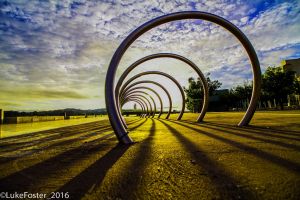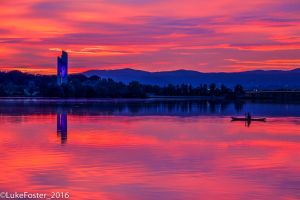 Photos by Canberra School of Photography Graduate, Luke FosterYou’re probably showing your age if you remember the phrase ‘Kodak moment’, but a generation ago it referred to capturing something special. Now Kodak’s claim to fame is most likely in a business journal warning readers about the perils of digital disruption.
Photos by Canberra School of Photography Graduate, Luke FosterYou’re probably showing your age if you remember the phrase ‘Kodak moment’, but a generation ago it referred to capturing something special. Now Kodak’s claim to fame is most likely in a business journal warning readers about the perils of digital disruption.
One person who has ridden the wave of film, to digital and now to smartphone images is Irene Lorbergs. Irene is a professional photographer and founder of Canberra School of Photography and has an uncanny knack of pivoting her business at just the right time to take advantage of new trends and opportunities.
“I’ve always been interested in photography, although it wasn’t my first choice as a career. However, thanks to Gough Whitlam I applied, and was accepted, as a mature-aged student and did a Visual Arts degree at the Sydney College of the Arts, looking for something a little more creative in my life. This was in response to a plea and encouragement from my employer at the time, one of the very first female justices in Australia."
“After my studies, my husband got a job in Goulburn and I walked into their local newspaper and asked about photography work and after 2 weeks of printing their weekend sports photos for Sales they offered me the chief photographer’s job. I had to learn on the job pretty quickly and it was really hard going at first. The local Mayor Tony Lamarra (“I always speak from the heart”), took me under his wing and through my job I got to know the town’s people relatively quickly and enjoyed being part of the community. I found out the local TAFE didn’t have a photography department, so was hired to set that up for them. I then started my teaching career at Goulburn TAFE."
“As people I encountered were forever asking me how to use their cameras I saw this as an opportunity and set up the Goulburn School of Photography and ran it out of my house and surrounding acres”.
This was the beginning of a long relationship with teaching photography and saw Irene weather the transition from print to digital photography.
“I came to Canberra and went to the ANU School of Art and got a job there teaching all the first year students about photography and how to use a camera and printing in the darkroom, for three years. I then moved to the University of Canberra, teaching photography in their Art and Design department for 15 years – albeit it was on a ‘sessional’ basis which lasted for all that time!”.
According to Irene, photography has also changed in itself in that it’s not as structured and the images that people require now aren’t as formal as the posed shots that used to be standard.
“Now it’s acceptable to take candids, almost snapshots, and you have immediate feedback and can make adjustments as necessary, whereas with film and medium format cameras you had to know your craft and technique. When I did wedding photography on a Saturday, I would rush to the lab very early on Monday morning and hand over the 12 or so rolls of films and stand by until they went through the chemicals, and then only would I relax when I saw that the negs were correctly exposed and give the lab another 4 days to produce the prints for the clients. You had to know what you were doing and be confident you could deliver.
“With my Canberra School of Photography, I’ve been teaching people from all walks of life. Many of the people I see don’t necessarily want to be a professional photographer, but for work they may need to be able to take a decent shot and learning takes away the stress from their job. It gives them camera confidence”.
While images are pervasive in all mediums these days, Irene says it’s certainly become more challenging to make a living purely from photography.
“I’ve had comments from other photographers, ‘don’t teach your students too well because we’re losing our work to them!’
The photographer a decade or so ago had to rely on his or her skill to get the perfect shot, but not only have cameras changed but software has also removed that competitive edge.
“I often hear people say they’ll take a shot and if it doesn’t look right they can simply fix it in Photoshop”.
 Photos by Canberra School of Photography Graduate, Luke Foster
Photos by Canberra School of Photography Graduate, Luke Foster
Irene’s latest pivot takes advantage of the growing number of tourists visiting Canberra.
“I’m always trying to build up my school and do different things”, says Irene.
“I’ve started to do ‘Capture Canberra Photography Tours’. I figure after years of field trips with Canberra School of Photography, I’m a tour operator anyway and locals as well as visitors have rarely been where we go. I have lots of secret little places scattered all around Canberra and I love taking people to places they’ve never been before.
“When we went to Enlighten to take photos, most of the people on the tour had never experienced that before. So, I’m taking people to discover things they have never seen in Canberra. We meet up at a point and walk around together taking photos and I then give advice, tips and suggestions to make their images look more interesting and strikingly creative.
“I am working on building up the Capture Canberra Photography Tours more. I can cater to small, intimate as well as huge groups. I plan to get more involved with events that bring people to town and engage with those people more. We’ve got so much to offer in Canberra and it’s really been hidden, it’s a shame really, so I would like to show more of the secrets of Canberra. There is so much to see and do and you don’t have to go very far at all”.
“I also run monthly ‘Zoo Focus’ photography tours for the National Zoo & Aquarium, so I really feel like I’m very much involved with the tourism industry of Canberra”.
Not lost on Irene is the move away from big cumbersome cameras to using the technology we have on us for most of the day – smartphones.
“People are amazed after I show them a few simple tricks, the difference it makes to their images! While everyone might not carry their big professional camera with them all the time, we do carry smartphones, and I’ve given tips and run courses on how to take photos with your smart phone – the cameras in phones are getting more sophisgicated with more functions and features and very high resolution. These smartphone cameras are now so easy to use. In my workshops and courses I show my students how to get the most out of these cameras by utilising the many built in features that people don’t know about. When I did some research recently for a DSLR workshop I was running that also asked for iphonography segment, I was pleasantly surprised and knocked out by the latest technology on offer. Even the highly acclaimed journalists’ Walkley Award recently was won by an image taken on an iphone.
Irene is also starting to teach a totally different segment of population about the wonders of photography but she’d like to keep that close to her chest right now.
For someone who started her business later in life, Irene is a great example of using digital disruption to your advantage, no matter how big or small your business.
About Lighthouse Business Innovation Centre
Lighthouse has a strong track record of supporting entrepreneurs, researchers and inventers on the path from concept to commercialisation. Since July 2008, Lighthouse has worked with over 990 distinct enterprises and provided group and peer based services to over 3400 enterprises and individuals. For over five years Lighthouse has successfully delivered business advice, education, mentorship and networking opportunities to help these businesses commercialise their ideas and grow their companies. Lighthouse also delivers programs such as the ACT Microcredit Program for the ACT Government. Visit www.lighthouseinnovation.com.au for more information.


